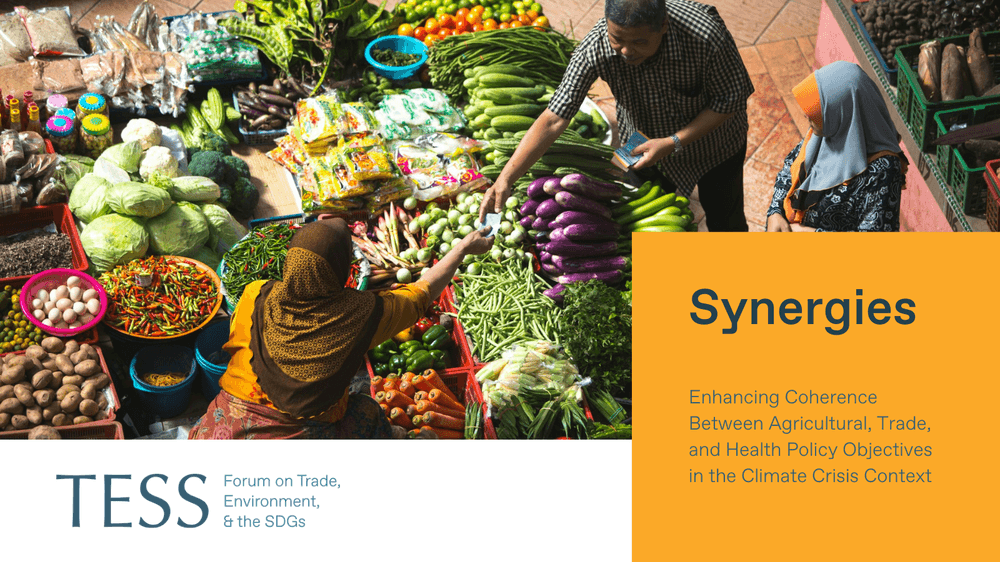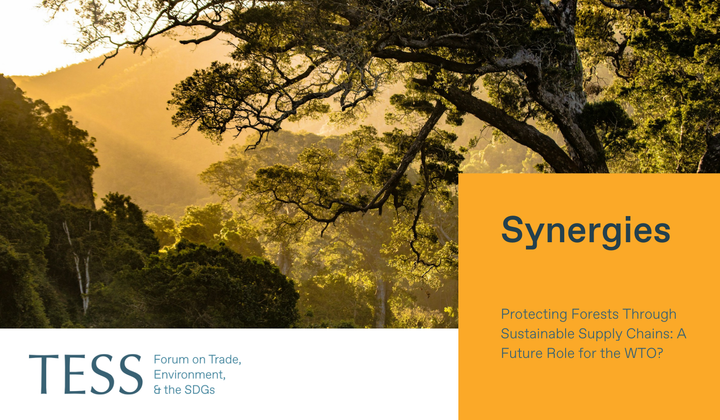There is an urgent need for global trade policy instruments and international trade cooperation to support sustainable agriculture and improved food systems, nutrition, and health.
This article is part of a Synergies series on climate and trade curated by TESS titled Addressing the Climate Crisis and Supporting Climate-Resilient Development: Where Can the Trading System Contribute? Any views and opinions expressed are those of the author(s) and do not necessarily reflect those of TESS or any of its partner organizations or funders.
-----

Food systems contribute around 30% of greenhouse gas emissions globally. Unsustainable agricultural practices may result in soil degradation, which impacts long term livelihoods and food security. In addition, commercialized food production, often combined with monocropping, extensive use of fertilizers, and land clearing/deforestation, contributes to higher greenhouse gas emissions and the loss of biodiversity and leaves communities vulnerable to climate change impacts. The resulting food insecurity, and particularly reductions in access to healthier foods, contributes to unhealthy diets, excess calories, and, consequently, non-communicable diseases. Moreover, exposure to agrochemicals and pollution and the excessive use of antibiotics may lead to further chronic health problems.
Food system transformation is critical for sustainable development. At the 2021 United Nations Food Systems Summit, food systems transformation was identified as the single greatest lever with the ability to deliver on social, environmental, and economic development outcomes and help achieve the UN Sustainable Development Goals. A transition towards sustainable, resilient, and health-promoting food systems can ensure that all people have access to nutritious, safe, and culturally appropriate foods, while also protecting planetary health.
International Trade Policies and Food Systems Transformation
Global trade policies have a significant influence on food systems and diets. On the one hand, lower barriers to trade of food products, services, and green technologies may enhance food security and resilience to climate change. On the other hand, trade liberalization can also contribute to environmental, economic, and social externalities, including deforestation, livelihood vulnerabilities, and food insecurity. Increased trade in ultra-processed foods has been shown to contribute to less healthy diets and the rise of malnutrition.
There is an urgent need for global trade policy instruments to support sustainable food systems transformation. Trade rules related to technical barriers to trade, subsidies, sanitary and phytosanitary measures, and tariffs can all play a role in shifting incentives towards sustainable and healthy food systems.
There is an urgent need for global trade policy instruments to support sustainable food systems transformation.
It is also critical that trade agreements support domestic policy autonomy to encourage sustainable and healthy food systems. When governments work to introduce policies to mitigate the negative impacts of trade in relation to agriculture, health, and the environment, they may face challenges in trade fora related to the design of these measures.
As an example, every member that has introduced mandatory front-of-pack nutrition labelling has encountered specific trade concerns at the World Trade Organization (WTO), which may cause some governments to hesitate to introduce strong labelling measures. These concerns relate to the necessity of these measures for achieving public health objectives (taking into account potential impacts on trade), their alignment with international standards, and the importance of a scientific basis to underpin their design. To date, these concerns have been addressed through dialogue, resulting in clarifications and sometimes changes to the design of measures.
Opportunities for Trade Cooperation to Make a Difference
Trade, agricultural, environmental, and nutrition policy are not inherently at odds; they all play a role in achieving sustainable development. There is a clear recognition within trade agreements of the legitimacy and importance of health and environmental objectives. Even more, trade bodies are actively working to strengthen cooperation. For example, the WTO held a one day symposium on trade and nutrition in 2024, to raise awareness of this important issue.
Identifying points of synergies between economic, environmental, and nutrition objectives is critical to strengthen policy coherence.
Identifying points of synergies between economic, environmental, and nutrition objectives is critical to strengthen policy coherence. At the national and global level, there is a need to develop mechanisms to enable engagement between the health and trade sectors in the negotiation and implementation of trade agreements, and to strengthen the design of environmental and nutrition policy measures. This strategic engagement can enhance coherence and reduce tensions between trade, agricultural, environmental, and nutrition objectives.
The inclusion of clauses that safeguard environmental and health policy in trade and investment agreements is also critical to support the achievement of sustainable development. Such clauses aid the interpretation of agreements, and provide clarity on the points of intersection between policy mandates related to trade, environment, and health.
Sustainable Food Systems Chapters in Trade Agreements
Further, two new agreements have explicitly addressed sustainable and healthy food systems. Our team examined the recent inclusion of Sustainable Food Systems (SFS) chapters in the EU-New Zealand Free Trade Agreement (FTA) and the EU-Chile Advanced Framework Agreement (AFA). These chapters focus on cooperation to improve the sustainability of food systems across supply chains, from food production to food loss and waste, and Indigenous knowledge While they contain limited enforceable provisions, these chapters are important because, for the first time, sustainable and healthy diets have been explicitly recognized in trade agreements as a common goal for governments, and one that trade agreements can contribute to achieving.
Understanding what made the adoption of the SFS chapters possible in the EU-New Zealand FTA and the EU-Chile AFA can give insights into factors and strategies that can support inclusion of progressive measures in international trade and investment agreements.
In the EU, the SFS chapter offered an opportunity for aligning the interests of both agribusiness and environmentalist groups as it facilitates the diffusion of environmental sustainability standards abroad. This has potential benefits not only for the environment but also for maintaining the competitiveness of EU produce. In New Zealand and Chile, it helped to create public support for negotiating the EU-NZ FTA and EU-Chile AFA, respectively, by reflecting on bilateral commitments to environmental sustainability and healthy food environments.
In this context, inclusion in a trade agreement provided an opportunity to enhance and strengthen domestic policy priorities. For example, in the EU, the Green Deal, the Farm to Fork Strategy, and the 2021 Trade Policy Review served as foundations for the SFS chapter. In Chile, domestic policies regulating antibiotics use as growth promoters paved the way for including a provision in the EU-Chile AFA on phasing them out gradually. Both in Chile and New Zealand, the national commitments made after the 2021 United Nations Food System Summit to transform food systems helped to set the tone for the SFS chapter negotiations.
Importance of Cross-Sectoral Policy Dialogue
Finally, building capacity for cross-sectoral dialogue between trade, agriculture, nutrition, and environment policymakers is key to support effective engagement. This will facilitate the integration of diverse insights on the contribution of food systems to sustainable development and on the scientific evidence base underpinning the design of key measures. By working together, we can develop more strategic and effective food system policy, and ensure that trade and other economic policies protect and promote improved food systems, environmental sustainability, nutrition, and health.
----------
Anne Marie Thow is a Professor in Professor in Public Policy and Health at The University of Sydney.
Dori Patay is a Research Fellow at The University of Sydney.
-----
Synergies by TESS is a blog dedicated to promoting inclusive policy dialogue at the intersection of trade, environment, and sustainable development, drawing on perspectives from a range of experts from around the globe. The editor is Fabrice Lehmann.
Disclaimer
Any views and opinions expressed on Synergies are those of the author(s) and do not necessarily reflect those of TESS or any of its partner organizations or funders.
License
All of the content on Synergies is licensed under a Creative Commons Attribution-NonCommercial-ShareAlike 4.0 International (CC BY-NC-SA 4.0)
license. This means you are welcome to adapt, copy, and share it on your
platforms with attribution to the source and author(s), but not for
commercial purposes. You must also share it under the same CC BY-NC-SA
4.0 license.
If you would like to reuse any material published here or if you have any other question related to Synergies, send an email to fabrice.lehmann@graduateinstitute.ch.





